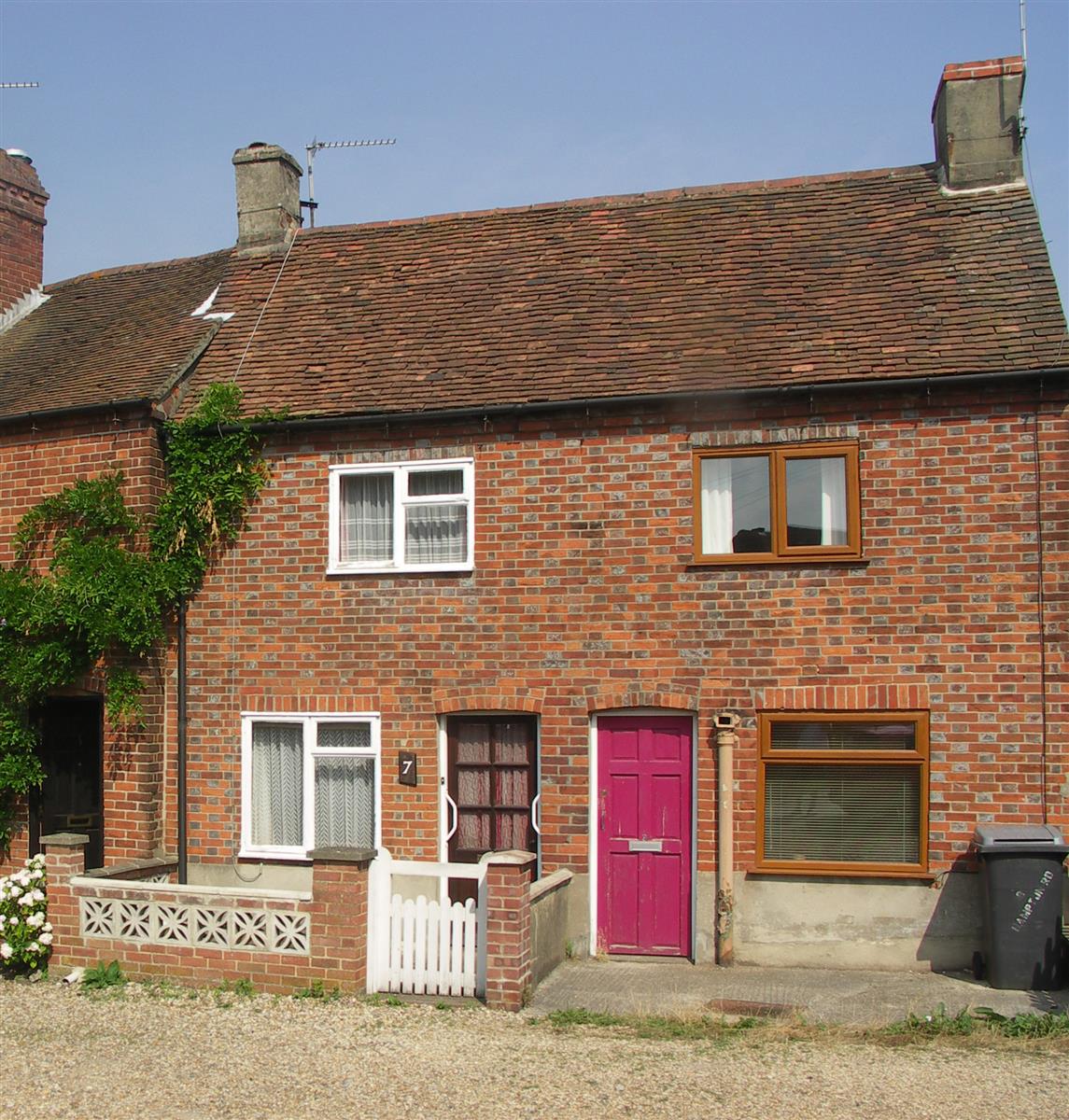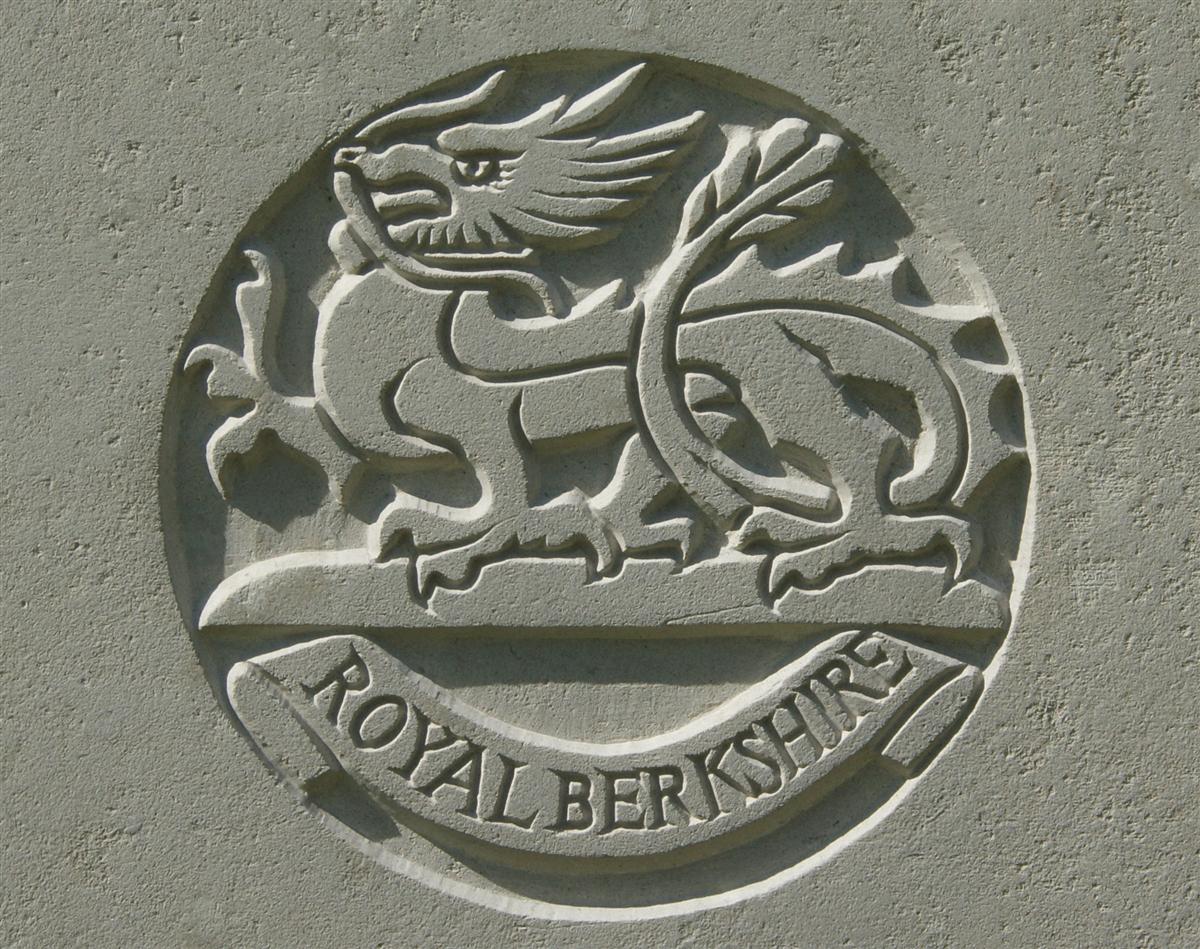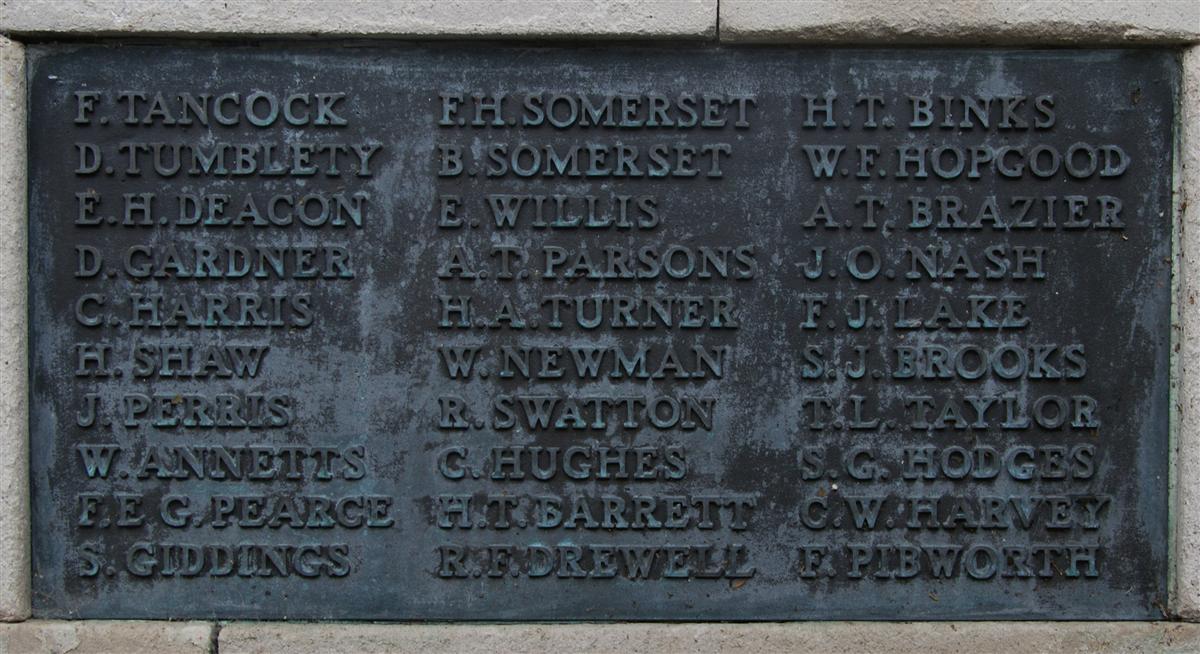Edward Joseph Willis
Private 10115 Edward Joseph Willis, 2nd Battalion, Royal Berkshire Regiment

The Lewis family home in Hampton Road (right). |
Edward was born in Newbury in mid-1897 the son of Edward Willis and his wife Phyllis née Wilkins. Young Edward was their second or third child, it has not been possible to determine which because he had a twin sister, Kate Maria and readily available official records date births to within three months, not minutes. Their elder sister was Marian Annie N (born 1895); they also had younger siblings: Mildred (1899), William Obed (1900), Arthur Harry (1902) and Thomas James (1906).
The family lived in Hampton Road in the area of Newbury known colloquially as ‘The City’ – it is not known how this nickname became to be applied, some view the area as the site of the original settlement of the town in Saxon times, when it was known as Ulvritone. However, this is not born out by any real evidence. It was not a prestigious address, but a lively one with a sense of community and a sub-culture of its own.
On 27 December 1907 Edward senior died at the National Hospital, Queen's Square, Holborn, London, there were multiple causes (paraplegia, spinal tumour, cystitis-septicaemia) given on the death certificate. Phyllis worked as a charwoman, but times would have been tough, fortunately she may have had support from her family – her brother Thomas lived a few doors away in Hampton Road.
At the time of the 1911 census young Edward was still at school, aged 13, but he would have left soon after to find employment. Whatever this employment was it seems that he decided that he would be better off in uniform and enlisted in the Royal Berkshire Regiment on 3 February 1914 still aged only 16. Even today the British Army takes recruits as young as this, and faces much international criticism for doing so; however, young recruits are not expected to face the enemy and fulfil less dangerous roles (bugler, bandsman, etc) while preparing for more active service once they are old enough. In 1914 Army Regulations set a minimum age limit of 19 for active service.
When war was declared on 4 August 1914 a great many boys attempted to enlist and many a recruiting sergeant ‘passed a blind eye’ when a young lad appeared before him declaring himself to be 18. In this way boys as young as 14 found themselves at the front dying for their country. However, this does not explain how Edward found himself landing in France on 27 December 1914, still only 16 years old. There is a well known account by a young boy soldier in the artillery who, desperate to stick with his older mates when they prepared to cross the channel in August 1914 pleaded with his superiors not to leave him behind (as they knew they should). The proverbial ‘blind eye’ was used again and the lad’s diary goes on to give a graphic account of the retreat from Mons.

The regimental badge of the Berkshire Regiment, as used on CWGC headstones. |
In France Edward was sent to join the 2nd Battalion of the Royal Berkshire Regiment (part of the 25th Brigade, 8th Division), probably among a draft of 20 NCOs and men who joined the battalion in billets at Laventie on 3 January 1915. For the next two months the battalion went back and forth between these billets and the trenches at Fauquissart spending three days in the line, two or three days in billets and then back to the line. The trenches were all but untenable being more waterlogged ditches than defensive positions. During December and January they were gradually replaced by a series of above ground breastworks.
On 2 March the battalion moved to billets at Riez Bailleul as the 8th Division prepared for its part in a planned assault on the German held village of Neuve Chapelle. On 9 March the division deployed in preparation for the assault; the 2nd Berks were positioned in trenches astride the road from Tilleloy to Neuve Chapelle. During the bombardment of the enemy positions that opened the attack the battalion report on the assault states that it ‘suffered somewhat heavy casualties from our own artillery fire.’ At 8.05am the men advanced and took the enemy’s first line with little opposition – the main cause of casualties continued to be ‘friendly’ artillery fire. The men carried on and took the 2nd and 3rd trench lines shortly beyond which they stopped. At 8.35 a battalion of the Rifle Brigade passed through the 2nd Berks in order to continue the assault and the battalion’s main contribution to the Battle of Neuve Chapelle was over.
Reading Mercury, 15 April 1915
It was from the centre of our attacking line that the assault was pressed home soonest. The guns had done their work well. The trenches were blown to unrecognisable pits dotted with dead. The barbed wire had been cut like so much twine. Starting from the Rue Tilleloy the Lincolns and the Berkshires were off the mark first with orders to swerve to the right and left respectively as soon as they had captured the first line of trenches to let the Royal Irish Rifles and the Rifle Brigade through to the village.
The Germans left alive in the trenches, half demented with fright, surrounded by a welter of dead and dying men, mostly surrendered. The Berkshires were opposed with the utmost gallantry by two German officers who had remained alone in a trench serving a machine gun. But the lads from Berkshire made their way into that trench and bayoneted the Germans where they stood, fighting to the last. The Lincolns against desperate resistance eventually occupied their section of trench and then waited for the Irishmen and the Rifle Brigade to come and take the village ahead of them.
An unnamed private wrote home:
Reading Mercury, 17 April 1915
We took the first trench in less than five minutes and swept on to the next. Men were falling on every side, shells were bursting all around us and the air seemed full of shrapnel and bullets. But our boys were magnificent, no one man wavered even for a second. Nothing could have stopped that charge - it was irresistible and the second trench was soon ours. We were all feeling pretty well fagged out by this time but on we went for the third line which was more difficult as there was a thick hedge and some barbed wire and we were fully exposed to the fire from the village. But the boys would not be stopped and in a very short time the third line was won. We set to work with our entrenching tools and soon consolidated our new position. The Rifles now came on to take the village and they gave us a cheer and a shout of 'well done Berks' I have always been proud of my regiment but never so proud as after that fight.
Over the next few days the battalion were called on a few times to support assaults by other battalions, which were either postponed or unsuccessful. Each time they moved to new support positions and then returned to the trench they captured in the opening minutes of the assault. On 13 March the battalion was moved again, this time to relieve the Rifle Brigade in its position east of Neuve Chapelle at which time its commanding officer, Col Feetham was ordered to assume command of the 24th Brigade leaving Lt A McGregor in command of the battalion and promoted Temporary Captain.
On 16 March the battalion moved back into support trenches until 18 March when it was withdrawn to billets at Croiz Barbee. Col Feetham returned and reassumed command.
At some point in all this activity Edward was killed, his entry in the Commonwealth War Graves Records gives his date of death as 15 March, but his parents were told that he died at some time between 10 and 15 March:
Newbury Weekly News, 15 Apr 1915 – Local War Notes
Another intimation has been received of an Newbury man having been killed in action in the taking of Neuve Chapelle, Mrs Phyllis Willis, of Hampton Road, having received a notice from the War Office of her son having been killed between the 10th and 15th of March in the fight around this place.
Edward’s remains were never identified, suggesting perhaps that he was the victim of shellfire (very possibly from Allied guns) – in which case the earlier date of 10 March would make far more sense.
He is remembered on the Le Touret memorial a short distance from where he fell. This memorial commemorates the missing British soldiers of several battles (La Bassée, Neuve Chapelle, Aubers Ridge and Festubert) that took place in this section of the front during 1914 and 1915.

Edward's name on Newbury War Memorial. (upper middle) |
Family
Fortunately his brothers were too young to serve in WW1 though at least one, Thomas James, served in WW2.

Find a memorial :
| Died this day: | |
| 02 March 1943 | |
| K F Bartholomew | |
| Newbury |

Like this site? Show your appreciation through a donation to a great charity.